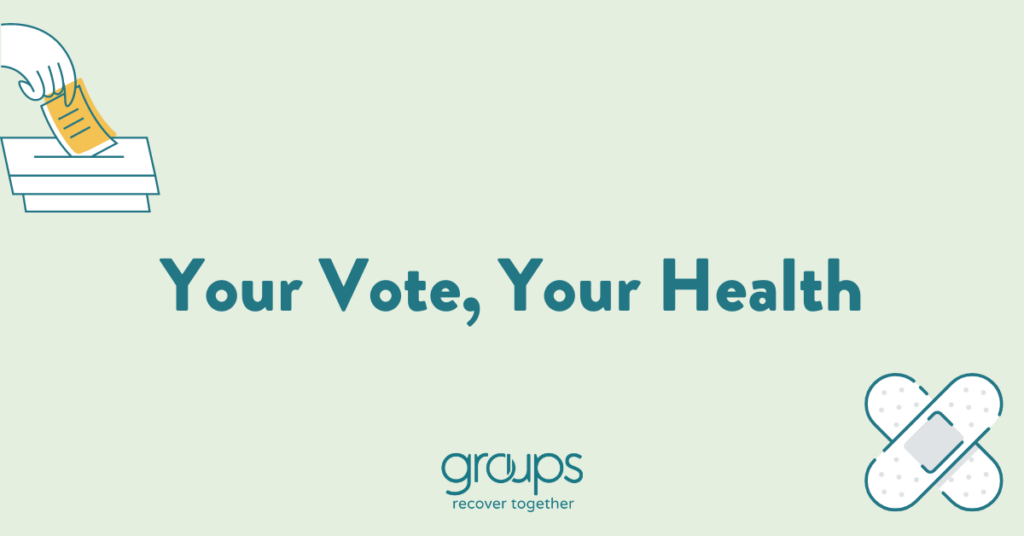Written by Tina Pettingill, MPH, Groups Recover Together’s Director of Government Affairs
This article is not intended to persuade you to vote for any specific party or politician. It’s important that you have the chance to research the issues you care about and make choices that best serve you and your family. Want to know how to get involved in recovery advocacy? Check out my first article.
When it comes to voting, most people think about the economy, taxes, or schools. However, one of the areas most impacted by your vote is your health. This is especially true in terms of substance use disorders (SUD) and treatment. Whether local, state, or federal, elected officials make critical decisions. They shape the healthcare systems and community resources we rely on. They also shape the public health policies that influence our well-being.
Voting is not just about casting a ballot. It’s also about understanding the issues at stake. Here’s how your vote affects health and substance use treatment at every level.
Local elections: Ground-level public health and addiction services
Local governments are on the frontline of managing public health. They play an important role in treatment and recovery. They have control over key factors that can either support or hurt efforts:
- Funding for addiction services: Local officials decide how much funding public health departments get. These departments are often in charge of local addiction treatment services. Services can include needle exchanges, overdose prevention, and recovery programs.
- Drug court and diversion programs: Many cities or towns run drug courts or diversion programs. They’re aimed at keeping people with SUD out of jail and connected to treatment. These programs offer a more caring perspective on addiction. Instead of viewing it as a legal issue, they know it’s a public health one. Local elected officials decide if these programs continue.
- Narcan access: Narcan is life-saving medicine that can reverse opioid overdoses. It is often given by health departments, clinics, or first responders. Local leaders decide how to distribute and fund this critical resource. This can be life and death for someone experiencing an overdose.
- Community-based recovery programs: Local councils also make decisions about zoning laws. These laws affect where treatment and recovery services can be. Zoning can directly affect how available services are.
Your local vote decides who runs city councils, school boards, and health departments. It shapes how treatment services are funded and prioritized.
State elections: Treatment access and addiction policy
State governments control healthcare regulations and treatment programs. This means that state-level elections are crucial for those affected by SUDs. Here are some ways state officials have influence over SUD-related issues.
- Medicaid expansion: One of the biggest state-level health issues is Medicaid expansion. Many people with addiction or mental health issues rely on Medicaid. States that have expanded Medicaid have more treatment access. However, ten states still have not expanded Medicaid. Medicaid decisions are in the hands of state lawmakers. It’s also sometimes on the ballot.
- Good Samaritan laws: These laws protect people who overdose and need help from legal issues. Voting for state legislators who support these laws can make a huge difference. It can help your community respond to drug-related emergencies. These laws protect people seeking medical help during a critical moment. They remove a major barrier to saving lives.
- Mental health parity laws: Many people who experience addiction also have mental health disorders. States can pass laws that make insurance companies cover mental health and SUD treatment equally. This helps ensure that those who are struggling can access the care they need.
- Syringe exchange and harm reduction programs: Some states have legalized harm reduction strategies. One example is syringe exchange programs. These programs can reduce the spread of HIV and hepatitis C. However, some people don’t like them. We need state lawmakers who understand harm reduction to keep these programs going.
- Marijuana legalization: As more states think about changing marijuana laws, other drug policies may change too. These efforts come with policies that control where and how weed is sold and taxed. They also control how states set aside funding for addiction treatment programs. Voting in state elections determines how these policies evolve.
Federal elections: National health and addiction policy
Federal elections can have a big impact on health policy. This can include how addiction and SUDs are treated across the country. Here are a few examples.
- The Affordable Care Act (ACA): The Affordable Care Act (ACA) has helped millions of people get treatment. The ACA requires insurers to cover SUD services as part of essential health benefits. However, federal lawmakers often debate changes to the ACA. Efforts to remove or weaken it could strip away coverage. Your votes for the House, Senate, or presidency shape the future of this policy.
- National opioid response: The overdose crisis has been a big part of national health policy. In recent years, the federal government has spent billions on the crisis. Their funding brings prevention, treatment, and recovery to our communities. Federal elections can change how much funding goes to fighting the crisis. It can also impact how resources are distributed across the nation.
- Criminal justice reform: Federal elections can also help reform criminal justice. The First Step Act reduces sentences for nonviolent drug offenses. It helps people struggling with addiction avoid being in jail for a long time. Lawmakers can make addiction a public health priority.
- Funding for addiction research and programs: Institutions that do research and give grants for addiction services rely on federal funding. The reps you vote for determine the level of federal investment. They impact how much we know about addiction and how innovative treatment can get.
Your health, your vote
When you step into the voting booth, remember that your vote has power. It can impact life-saving policies related to substance use and treatment. This election, vote like your health — and the health of those with addiction — depends on it.
Keep in mind that election season can be stressful! The constant news updates, difficult talks, and negative ads can be a lot. Practice self-care as you navigate this election season. Vote4MentalHealth has tips and resources to help you bring down your stress level.




